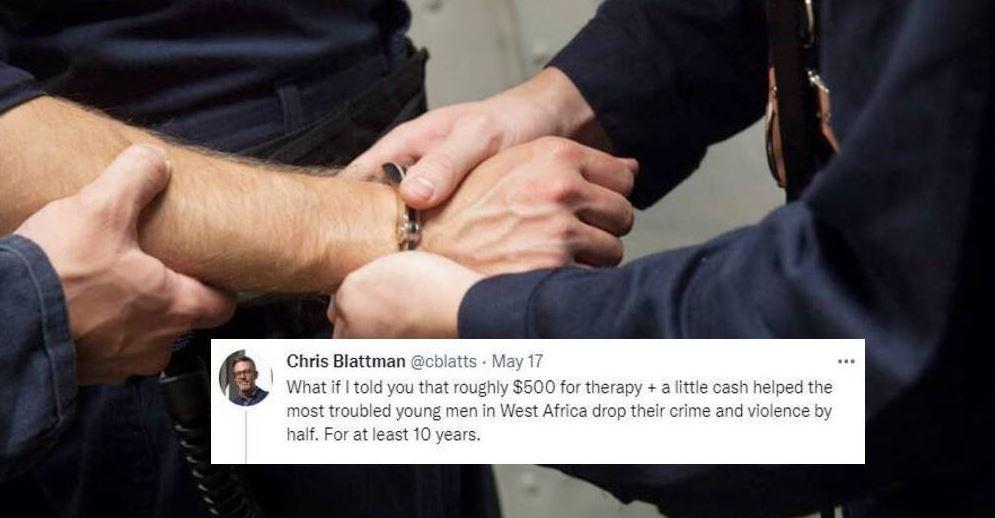“What if I told you that roughly $500 for therapy + a little cash helped the most troubled young men in West Africa drop their crime and violence by half. For at least 10 years,” Chris Blattman, professor of global conflict studies at the University of Chicago, opens a stunning tweet thread introducing the results of a study he began 13 years ago.
Blattman traveled to Liberia in 2009 with his wife as she did research on reintegrating ex-fighters from the war. Blattman had free time so he met up with Johnson Borh.
“He was a combatant in the war and now ran some kind of NGO. He seemed to know everyone and be able to go everywhere. So I asked him to show me around how the crime and drug markets worked,” Blattman tweeted.
Blattman couldn’t get over the fact that wherever they went, men would run over to Borh and give him a big hug. “How do you know Borh?” he asked them and every time he heard a similar response.
“I used to be like them,” and they’d point to the drug den or pickpockets. “But then I went through Borh’s program.”
He and his organization, NEPI, recruited the most dangerous men in the city. People who led lives of violence.
They met in abandoned buildings, in groups of maybe 20 for a couple of hours a day. Johnson trained counselors. They eked out a living on the program. pic.twitter.com/yChQrlMvUF
— Chris Blattman (@cblatts) May 17, 2022
For 15 years, Borh and his colleagues ran the STYL: Sustainable Transformation of Youth in Liberia program to help transform the most dangerous men in the city. “They met in abandoned buildings, in groups of maybe 20, for a couple of hours a day. Johnson trained some counselors, and they eked out a living on the program,” Blattman wrote.
Blattman got his team of researchers together to do a larger version of a similar program using the cognitive behavioral therapy techniques used by Borh. Cognitive behavioral therapy (CBT) is an approach for reducing self-destructive beliefs and behaviors and promoting positive ones.
“Things looked really good. So I recruit my coauthors to help run a large-scale study,” Blattman tweeted. “We scaled up, raised a million dollars, and ran a huge randomized controlled trial with 999 of the toughest men in Monrovia.”
The therapy sessions focused on three types of behavioral change. The first was an attempt to get the men to “behave and self-identify as normal society members rather than as an outcast or criminal.” The second was to foster future orientation over present-biased behavior. The program taught skills to “manage emotions, reduce impulsivity, become more conscientious and persevering, and become more planful and goal-oriented in their daily activities.”
Finally, the team worked to teach the men how to deal with anger, interpersonal violence and threatening situations.
The researchers also held a cash lottery where some men were randomly selected to win $200. The men were told they could do anything with the money but were encouraged to use it to start a business or make home improvements.
The team followed up a year later and the results were inspiring.
Huge impact! Crime, violence and antisocial behaviors down about 50% among those who get CBT+Cash. CBT alone seems to fade a little in impact over time.
Most of the evidence points to the economic assistance helping men entrench the behavior changes, avoid a return to crime. pic.twitter.com/r6pXFLaWTk
— Chris Blattman (@cblatts) May 17, 2022
Those who received the CBT and the cash slashed their antisocial behaviors by 50%. Those who had just therapy saw decreasing results over time, but those who received the cash and therapy had their new, positive behaviors more deeply entrenched.
Ten years later, the team was a little uneasy about seeing if the impact had lasted.
“I was pessimistic,” Blattman said. “We surveyed experts in advance. Almost all expected CBT Only or Cash Only to have no effect whatsoever after 10 years. For Therapy plus Cash, one-third of the experts predicted no effect at all. 2/3 predicted steeply diminished impacts.”
However, the researchers found that crime and violence were still down by 50% with those who got the CBT and cash.
But we see HUGE sustained impacts. Crime & violence still down by about 50% from CBT+Cash.
On thefts/robberies alone, they report ~34 fewer at both 1- and 10year points. Interpolating, this means ~338 fewer crimes per participant over 10y—$1.50 per crime avoided given $530 cost pic.twitter.com/vUsWTyhL2K
— Chris Blattman (@cblatts) May 17, 2022
“The therapy helped participants change their intentions, identity and behavior, and provided almost daily commitment and reinforcement,” the study’s conclusion states. “After eight weeks of therapy, the grant provided some men with the cash they needed to maintain their new identity—to avoid homelessness, to feed themselves, and to continue to dress decently.”
Blattman believed that his team’s findings are important and should be put into practice today in America for two reasons. “Gun violence is spiking in the Americas,” he tweeted. “Cities need solutions. They’re searching for ones that don’t involve coercion.”
Second, it works.
“All the evidence suggests CBT-informed programs are fast, effective, hyper-targeted, non-coercive ways to reduce violence,” he wrote.







































